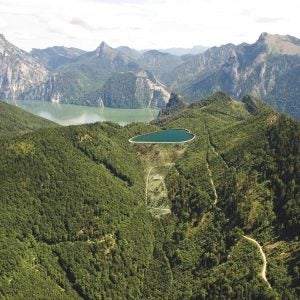
So what should we be doing to encourage the young generation to consider hydropower engineering as a career choice? Promote and provide suggests IWP&DC editor, Carrieann Stocks
The promotion of public awareness of science and engineering should be seen as an important activity if we’re ever going to increase the numbers of students pursuing higher education courses in these subjects, particularly if we want encourage them to view hydropower as a rewarding career path.
The demand is there for a growing workforce to help meet the needs of new hydro development but also to help handle the existing assets and refurbishment projects before the larger group of workers running the show so far move out of the active workforce. With the average age of workers in the energy industry at an unsurprising 50, and a high percentage sitting above that figure, we really need to start attracting those younger recruits who no doubt will bring fresh ideas and a new exuberance to the sector. We’re also facing stiff competition from other renewable sectors so we really need to bring hydropower out into the open.
This has been a key message conveyed at numerous events I’ve attended over the years.One thing that has stuck in my mind is that solutions have often been discussed – but then not taken any further. Of course, there are incentives and programs out there, but very little has been publicised.
I believe there are two key words to consider when it comes to encouraging the younger generation to look at hydropower in a favourable light when considering their career paths – promote and provide.
Promote hydropower
So you’ve worked on a great hydropower project with immeasurable benefits? Well why not let the world know! Critics of the industry are often very vocal about why hydropower projects shouldn’t be developed – why not counter this and explain why they should. Let people know the opportunities the project brings to the local community.
Why not promote the benefits of working in the industry at universities and school career fairs? While I was at school I never once had someone tell me about the benefits and challenges of working in hydropower engineering. There are many ways hydropower could be introduced to the younger generation – including arranging to attend careers fairs, organising events, offering scholarships and graduate programs. The possibilities are endless.
Work with the trade associations to improve the public’s perception of the industry – show them that projects can be sustainable and environmentally sound. The National Hydropower Association in the US for example do some excellent work in promoting hydropower. They conduct research, carry out surveys into the public’s attitude towards hydropower, organise events and work with a number of other organisations to promote and develop hydropower.
The International Hydropower Association is another association working tirelessly to advance hydropower. The association works to build and share knowledge on the role of hydropower in renewable energy systems, responsible freshwater management and climate change solutions. Its Hydropower Sustainability Assessment Protocol is helping to develop sustainable hydropower and can only help improve the industry’s image.
Provide opportunities
While its all well and good promoting the benefits of the hydropower industry, it’s important to provide opportunities for young people to see what the industry has to offer. Some ideas include mentoring programs, graduate programs, school trips and competitions.
The steadily weakening demand for engineering courses follows on from significant falls in the numbers of school pupils choosing to study mathematics and physics. It is believed that students lose interest while at school because they are not enthused by the teaching methods and content of the science and mathematics courses. Furthermore, they cannot see the relevance of the issues they study to the world around them and future careers. I remember reading somewhere that it is recognised that pupils’ enthusiasm for these subjects can be improved through extra curricula activities that demonstrate the challenge and excitement of science and engineering projects and careers. You could start by providing some of these activities at schools and colleges in your project or operations area. Some great examples of programs that are working well include STEMNET (the Science, Technology, Engineering and Mathematics Network) which creates opportunities to inspire young people in Science, Technology, Engineering and Mathematics.
The organisation does this by working with thousands of schools, colleges and STEM employers, to enable young people of all backgrounds and abilities to meet inspiring role models, understand real world applications of STEM subjects and experience hands-on STEM activities that motivate, inspire and bring learning and career opportunities to life. Across the UK, STEM Ambassadors volunteer their time and support to promote STEM subjects to young learners in a vast range of original, creative, practical and engaging ways.
Why not see how you could get involved with similar projects, and help inspire the next generation of young engineers?
Starting from the May issue, International Water Power & Dam Construction will be running a new regular column where we will interview young engineers throughout the industry to discover what got them interested in a career in hydropower, and what their hopes are for the future of the industry.







